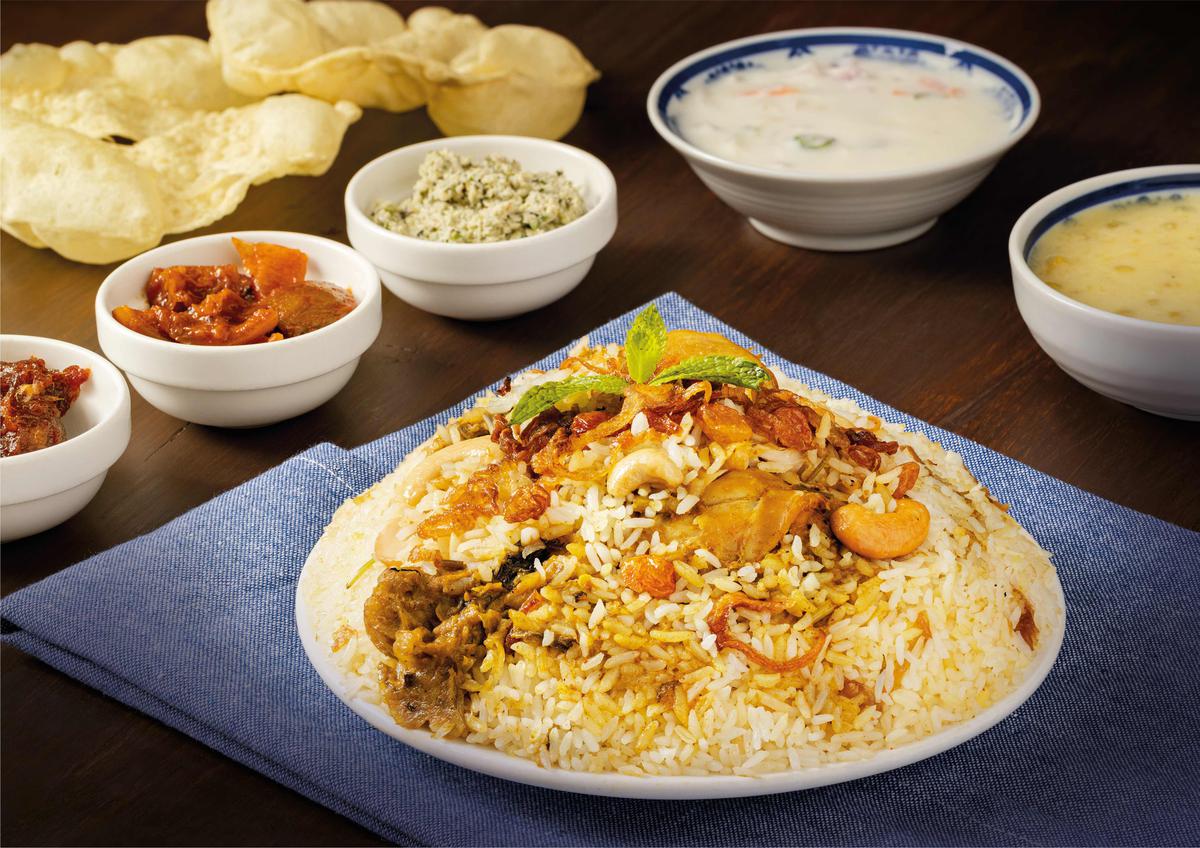Why Kozhikode’s Paragon Restaurant is on Taste Atlas’ list of 150 Most Legendary Restaurants in the World

Paragon restaurant in Kozhikode exudes an old world charm and is quite popular even decades after it was founded
| Photo Credit: K Ragesh
On a ‘festival day’ — Onam, Vishu or Eid — Paragon Restaurant in Kozhikode sells 700 to 1,000 kilograms of biryani. That is high praise from a city that considers biryani a religion. The cherry on the cake for Paragon is being placed 11th on experiential travel online guide Taste Atlas’ Top 150 Most Legendary Restaurants list for 2023.
“The restaurant has been called legendary and the biryani, iconic. However, I would like to add four other items on our list [Paragon’s] of bests — the fish curry made in coconut gravy, tea, parotta and sambar,” says Sumesh Govind, managing director Paragon Group, over the phone from Kozhikode. Tunday Kebab (Lucknow), Peter Cat (Kolkata), Amrik Sukhdev Dhaba (Murthal), Mavali Tiffin Rooms (Bengaluru), Karim’s (Delhi) and Ram Ashraya Mumbai, were ranked 12, 17, 23, 39, 87 and 112 respectively.
What started out as Paragon Baking Company in Kozhikode in 1939, best known across Kerala for its plum cakes, has grown into the Paragon Group, which has more than 25 branches spanning various cuisines in Kerala and Dubai. But it still retains its original space, in the heart of the city. “That space is more than a building for me. It is a temple!” says Sumesh. He remembers a granduncle telling him how the people of the city would come to Paragon Bakery to see fancy cars like Chevrolets and Impalas parked outside. “People came from as far as Thiruvananthapuram and Ernakulam [Kochi] for our Christmas plum cakes.” It was started by his grandfather PM Govindan and father PM Valsan.
No secret ingredients
Mutton chops (more popularly known as chaps) and bread, chicken biryani, mutton/vegetable stew and appam were the non-snack items on the menu those days. ‘Paragon biryani’ is the result of around eight years’ work by Sumesh and Chef Vijayan Pillai who worked in tandem — sampling biryanis in Kerala and elsewhere and working with biryani ustads — to find the perfect recipe.
“Mind you, there is no secret ingredient!” laughs Sumesh.
What drove him on the quest for the perfect recipe was another Kozhikode-based hotel, Bombay Hotel, selling 300 to 400 kilograms of biryani every day for lunch. “While we were barely selling 20 or 30 kilograms. I thought ‘why are we not selling as much?’ That was one factor that drove me to make the perfect biryani,” he adds. This meant getting biryani ustads to understand biryani. It also had him eating biryani every day. “I began looking forward to 12pm when Chef Vijayan would open the dum.” Feedback also came from Muslim friends who were quick to catch the minor, missing nuances of the flavours.

Paragon biryani
| Photo Credit:
SPECIAL ARRANGEMENT
“It is a combination of Thalassery and Malabar biryanis. The spices are bought locally from the Valyangadi market and freshly ground daily,” says chef Vijayan, who has been with the group for the past 33 years. While the meat is cooked for the former before being layered and dum-cooked, the meat is not pre-cooked for the latter. “The partially cooked rice is dum-cooked with the meat. What sets us apart is that we still use the traditional method of dum-cooking using charred coconut shells on the lid of the chembu (the utensil ). All our chefs in the other branches are trained here,” he adds.
Within a month and a half of launching it at the Kozhikode restaurant, sometime in the late 1990s, Sumesh and Vijayan knew that Paragon biryani had arrived.
The perfect recipe
The determination to serve the prefect recipes circles back to what Sumesh says is the secret of Paragon’s growing popularity. “The dish on the table is just the tip of the iceberg. A whole lot of other things go into getting it to the table — customer feedback, our Human Resource department’s work with the team, hygiene audit and staff appreciation to mention a few,” he adds.
The hospitality of the staff at Paragon, Kozhikode, is renowned. Waiters are known to encourage guests to eat that one appam more, or pazhampori to go with their tea. Sumesh laughs, “I tell my staff that kindness goes a long way.”
He has been inspired by the food culture of the city that is his home. “Sagar Hamzakka, owner of Sagar Hotel [Kozhikode] was a huge inspiration. The meals and chilli chicken aside, meen porichathu (fish fry) was a trend setter as was the parotta. Then there was Bombay Hotel, which was famous for its biryani. Then there is Rahmath, renowned for its beef biryani and Komala Bhavan, known for its legendary for mutton varattiyathu.”
Sumesh confesses that initially he was not interested in joining the family business. His father passed away when Sumesh was 14, and his mother took over the business. They had moved away from the bakery business. “My mother was adamant about handing over the business to me. A woman at the billing of a small restaurant in Kozhikode or anywhere else in Kerala was unheard of. But she did what had to be done. “ At 29 he came on board, bringing innovation and creativity. He went about doing things differently, adding new items to the menu, interacting with customers: “Along the way people labelled me crazy!” he says.
Thirty years down the line, there is a sense that those innovations have paid off as Sumesh Govind gears up for the opening of Paragon Restaurant’s newest branch in Bengaluru.
For all the latest Life Style News Click Here
For the latest news and updates, follow us on Google News.
